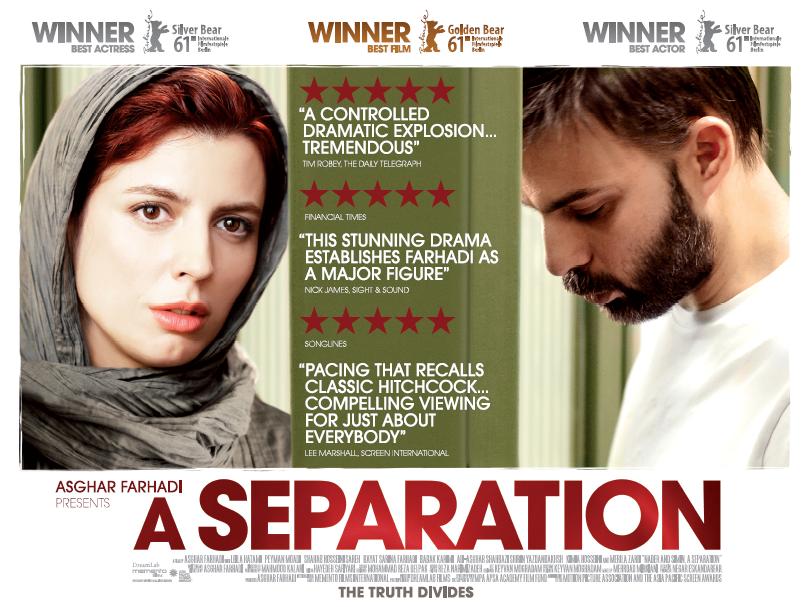A Separation is an utterly captivating, moving and impassioned drama that has added to critically acclaimed writer/director Asghar Farhadi’s growing abundance of awards. It won him the Golden Bear for best film at the 61st Berlin International Film Festival, (the first Iranian film to do so), the Silver Bears for Best Actress and Best Actor, and the Sydney Film Prize.
The complex plot commences with middle-class married couple, Simin (Leila Hatami) and Nader (Peyman Ma’adi) disputing with a lawyer about their desired divorce. Simin wishes to leave Iran with their 11 year old daughter Termeh (Sarina Farhadi) to search for better opportunities. Yet Nader wishes, or feels he must, remain and care for his father who has Alzheimers disease. The magistrate remains unseen as the couple dispute towards the camera and the viewer is launched into their difficult dilemma. Both sides of the story are displayed alongside each other with no bias at all. Viewers can judge for themselves the first of many agonizing moral dilemmas that will be presented throughout. The urgency in Simin’s voice, and Nader’s clear frustration that his wife cannot see the undeniable responsibility that he must take on, mean their plight is emphatically understood. The hurried and hasty dialogue make for an incredibly gripping opening, and after a matter of minutes the magistrate deems their problem too petty and a divorce is denied.
The couple decide to separate and Simin moves in with her mother. Despite the melancholic atmosphere there are gleams of acutely observed humour. Nader approaches the alien washing machine for the first time, perplexed, and tells his daughter he has no idea what setting to use. She looks away from her homework and nonchalantly replies ‘setting 4. It is faded around that area, so has obviously been used the most’. It is a subtle commentary on female domesticity, and the film frequently explores and debates gender roles in contemporary Iranian society.
Further drama ensues when Nader has to hire Razieh (Sareh Bayat), a stranger from a poor area who has been discovered through connections, to care for his senile Father during the day. Her demanding tasks are excruciating to watch as the elderly man steadily declines. He has become incontinent and Razieh rings a religious helpline to ask if she can clean him. The situation gives a fascinating insight into the demands of her religion and her dedication to her beliefs. Her small daughter, who she must take with her everyday, adds a tender and amusing touch as she tries to help by saying she ‘won’t tell daddy’ what Razieh has to do. This stage of the film is slower and less dramatic than others yet never ceases to be as thoroughly engrossing. The acting is so convincing and the situations so emphatic, the viewer is never allowed off the hook.
Razieh is hiding a secret from Nader, and is also keeping the fact that she is working for him from her destitute, hot-tempered husband. The situation for those involved can only become progressively worse and an argument over pay results in an incident that intertwines their lives, and the law, together with harrowing and painful consequences. What unfolds is relentlessly challenging viewing, the hand held camera and shallow filming is unsettling and intensifies the character’s claustrophobia in their close involvement with one another. Despite the constancy of the drama, A Separation never touches on tediousness or feels theatrical for a moment. The difficult and disconcerting viewing is so absorbing the film feels a privilege to watch, and it would be a strenuous task to find fault with it.
Sarah Jane Holland





